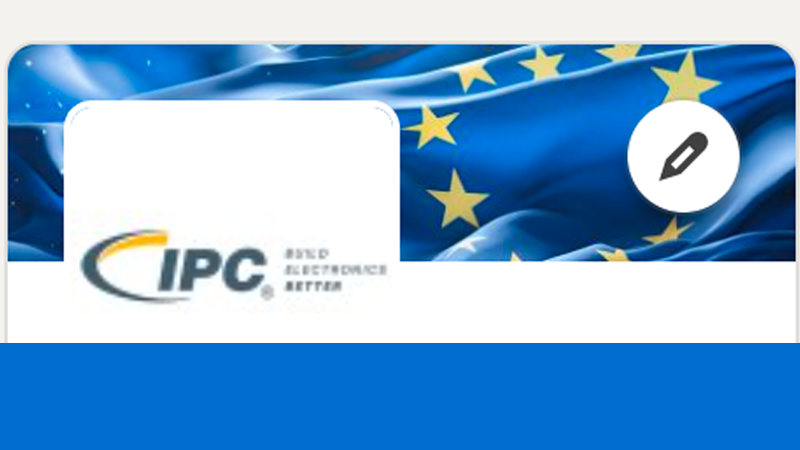 Dear IPC Members, Dear IPC Members,
As the EU Council sets its strategic agenda, IPC is ramping up efforts to emphasize the critical importance of Europe’s electronics manufacturing base. Alison James, IPC’s Senior Director of European Government Relations, recently highlighted these initiatives in SMT007. More information is also below and on IPC’s new LinkedIn page for Government Relations in Europe. Join other IPC members and get involved!
Meanwhile, in case you missed it, IPC President and CEO John W. Mitchell joined the WorkingNation Podcast this week to discuss our critical work around the CHIPS Act, semiconductors, and growing the electronics manufacturing workforce in the U.S.
If you or someone you know is interested in sustainability in electronics, join IPC and iNEMI for an in-depth virtual session on July 17, addressing the most pressing circularity challenges in electronics manufacturing.
As the IPC Government Relations team continues to advocate for your interests worldwide, we welcome your questions and feedback.
Just a note that Global Advocacy Report will break next week and will return on Friday, July 12. |
Chris Mitchell
Vice President, Global Government Relations
The Headlines at a Glance:
QUOTE OF THE WEEK
- On Strategic Challenges in Building Domestic Electronics Manufacturing
DEFENSE & SECURITY
- U.S. Congress Making Mixed Progress on Defense Electronics
EUROPEAN UNION
- IPC Presses EU Governments on ‘Silicon-to-Systems’ Strategic Concerns
- EU Should Use More ‘Subsidies and Tariffs,’ Top Official Says
IPC ADVOCACY AND YOU
- Strategic Challenges in Building Domestic Electronics Manufacturing
UPCOMING EVENTS
- Circularity Challenges in Electronics Manufacturing, Webinar (July 17)
HELP US SPREAD THE WORD ON SOCIAL MEDIA
KEEP IN TOUCH WITH US
QUOTE OF THE WEEK
 |
“The key question for U.S. policymakers and the industry is this: which electronics technologies and systems should be manufactured in the U.S. given their strategic importance to national security, economic competitiveness, and/or technological leadership? And what kind of investments are necessary to ensure such capabilities and capacities are put in place? The question is not moot, and it is not a matter for tomorrow. The U.S. today is equipping its men and women in uniform with less than the very best technologies because key segments of the electronics manufacturing sector do not have manufacturing capabilities that are state-of-the-practice in Asia.”
— Chris Mitchell, IPC VP of Global Government Relations, in SMT007 Magazine on strategic challenges in building domestic electronics manufacturing. |
DEFENSE AND SECURITY
 |
U.S. Congress Making Mixed Progress on Defense Electronics: The U.S. Congress has taken a few steps forward on its annual defense legislation with mixed results for defense electronics. On the plus side, the House of Representatives passed its version of the FY2025 National Defense Authorization Act (NDAA), and language in the committee report accompanying the bill shows IPC’s influence. In multiple passages, the Armed Services Committee urges support for integrated circuit (IC) substrate investment; pushes the Pentagon to accelerate efforts to move the PCB supply chain to secure sources; urges the prioritization of Defense Production Act purchases for printed circuit boards and substrates; and requests briefings from the DOD on progress related to securing the supply chain for display technology. Meanwhile, the Senate Armed Services Committee has completed action on its version of NDAA, and we’re still analyzing it. Once the full Senate passes its version, a House-Senate conference committee will resolve any differences. On the minus side, the early action on the FY25 defense spending bills contains no funding for PCBs under the Defense Production Act. In case you missed it, a recent article by IPC’s Rich Cappetto and PCBAA’s David Schild in Defense Opinion explains the situation and how a lack of funding to address U.S. shortfalls in electronic components related to semiconductors could undermine national security and the success of the CHIPS and Science Act. IPC Contact: Rich Cappetto.
EUROPEAN UNION
 |
IPC Presses EU Governments on ‘Silicon-to-Systems’ Strategic Concerns: In Brussels and beyond, IPC and the European electronics manufacturing industry are continuing to make the case for a “silicon-to-systems” industrial strategy. This month, IPC published a new report in partnership with DECISION and in4ma, “Securing the European Union’s Electronics Ecosystem,” which predicts a further drop in Europe’s global market share and rising risks to an array of critical sectors including aerospace and defense. IPC also issued a “Call-to-Action” with support from more than 30 companies and 15 trade associations, all urging the adoption of an Electronics Manufacturing Strategy under the European Commission’s next five-year mandate, backed by investments and policies to reduce EU dependencies in areas such as semiconductors, health, and digital technologies, echoing recent European Council conclusions. IPC invites everyone with an interest in EU electronics manufacturing to read IPC’s press release, review the report, and support the industry Call-to-Action. IPC Contact: Alison James
EU Should Use More ‘Subsidies and Tariffs,’ Top Official Says: In a speech on June 14, former Italian Prime Minister and European Central Bank President Mario Draghi provided a preview of his upcoming report on EU competitiveness, to be published in July. Draghi urged the EU to use “subsidies and tariffs to offset unfair advantages created by industrial policies and real exchange rate devaluations abroad,” warning that the bloc’s approach should, however, be “pragmatic, cautious and consistent.” Read the full report in Politico. The pending report forms part of the lead-up to the next European Commission mandate as new teams and priorities are formed for the coming five years. IPC Contact: Alison James.
IPC ADVOCACY AND YOU
 |
Strategic Challenges in Building Domestic Electronics Manufacturing: As billions in strategic investments flow into the U.S. microelectronics industry, policymakers seem to face challenges in supporting the entire electronics supply chain. In a Q&A with SMT007 Magazine, IPC’s Chris Mitchell highlights the complexities in aligning government funding with industry needs. Despite the governments’ oft-stated understanding of our position and their eagerness to revive domestic manufacturing, they seem to face uphill battles to implement IPC’s holistic “silicon-to-systems” strategy. Mitchell emphasizes the need for the U.S. and all governments to help modernize facilities, foster trusted supply chains, invest in R&D, and expand the skilled workforce. He underscores the urgency of achieving strategic autonomy amid the risk of supply chain disruptions, noting the importance of government and industry collaboration in addressing current vulnerabilities and ensuring future competitiveness. Read the story in SMT007 Magazine. IPC Contact: Chris Mitchell.
UPCOMING EVENTS
Circularity Challenges in Electronics Manufacturing: Webinar (July 17, 10:00 AM EDT) – Join IPC and iNEMI for an in-depth virtual session revealing the insights and outcomes from their recent workshop at the Electronics Goes Green conference in Berlin. Focused on addressing the pressing circularity challenges in electronics manufacturing, this event will discuss industry-driven solutions and next steps. The webinar will cover new industry standards, tools, and educational resources to foster efficient and effective adoption of circularity throughout the electronics manufacturing value chain. Don’t miss presentations by Kelly Scanlon, IPC’s lead sustainability strategist, and Mark Schaffer, project manager at iNEMI. Register today for FREE!
PLEASE "LIKE" AND "SHARE" OUR LINKEDIN POSTS

NEW LINKEDIN PAGE FOR EUROPEAN ELECTRONICS INDUSTRY: Colleagues, please visit and follow our new “IPC Government Relations in Europe” showcase page here on LinkedIn, where you’ll find useful information for people like you who care about government policy and the future of electronics manufacturing in Europe. We’ll be publishing news on industry data, events, our policy advocacy in Brussels and beyond, and what you can do to make a difference. |
|

I had a great chat with Ramona Schindelheim on the WorkingNation podcast. We talked about the work IPC is doing around the Chips Act, semiconductors, and growing the electronics manufacturing workforce in the U.S. I loved being able to mention to Ramona that if you’re looking for a career with room to grow and a strong future, electronics is that place. Listen our full discussion. |
KEEP IN TOUCH WITH US
Meet the IPC GR Team: Whether it is engaging with policymakers in the Americas, the European Union, or Asia, the IPC Government Relations (GR) Team proactively seeks opportunities to educate, inform and influence policymakers on policies that spur innovation, growth and competition, while protecting human health and the environment. But our success depends on your support and engagement. Learn more and get involved in IPC advocacy today! IPC Contact: Chris Mitchell.
Follow, like and share LinkedIn posts by IPC and/or any of us individually.
Take IPC’s five-minute public opinion survey and contact your elected officials via the IPC Action Alert Center.
Peruse our Advocacy pages on IPC.org.
Subscribe to this IPC Global Advocacy Report: If you are a member of IPC, manage your e-mail preferences and opt in to receive all “Advocacy” updates. If you are not an IPC member — or if you are not sure — please send a note to friends@ipc.org, and our staff will add you to the list. See prior editions of Global Advocacy Report.
Check out the latest edition of IPC Community, which spotlights IPC’s members and global activities.
Contact one of us if you have any questions or insights to share.
|